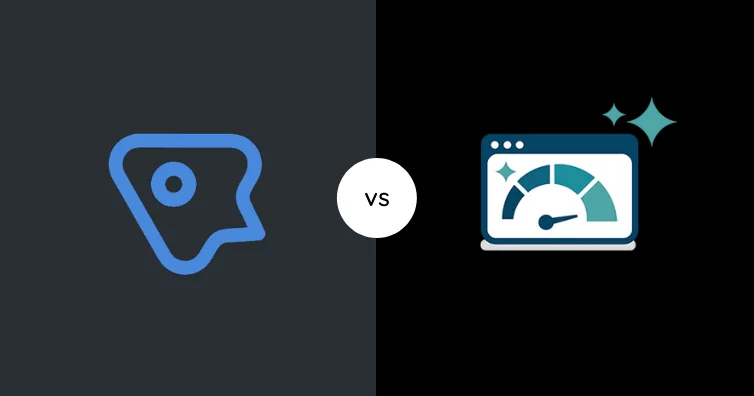
I would choose Perfmatters over Asset CleanUp any day of the week.
The interface is cleaner, the script manager is easier, it’s maintained better, and it has several “extra features” that can help with core web vitals like remove unused CSS, preload critical images, delay JavaScript, and small things like using a smaller Google Analytics tracking code.
Asset CleanUp will do the trick if you just need a free plugin to unload CSS/JS, but it really doesn’t go much beyond that since its extra features are already done by most cache plugins. I’m using Perfmatters on my own site and from what I see in Facebook Groups, most people are using this as well. Feel free to test Asset CleanUp and if it doesn’t work for you, get Perfmatters. I also have a detailed guide on configuring the Perfmatters settings to help get the most out of it.
Perfmatters vs Asset CleanUp Differences
- Script Manager
- Remove Unused CSS
- Delay JavaScript
- Image Optimization
- Host Analytics Locally
- Bloat Removal
- Preload, Prefetch, Preconnect
- CSS/JS Optimization
- Pricing + Documentation
Affiliate Disclaimer – I use affiliate links to Perfmatters and would really appreciate your support. It helps me write more helpful tutorials like this one. Seriously, thank you!
View Perfmatters features View Asset CleanUp/Pro features
1. Script Manager
Let’s talk about unloading CSS/JS since that’s the main function of each plugin.
In Perfmatters, you’ll activate the script manager in the Assets settings, view any page on your website, then find “script manager” in your top menu. In the script manager settings, you can enable test mode, MU mode, display dependencies, and see a global view of all scripts & styles you unloaded. Once the settings are configured, you can view all CSS/JS files on the page. You’ll also notice Perfmatters has more “exception rules” than Asset CleanUp when unloading assets. When you’re ready to publish changes, just toggle test mode OFF in the script manager settings.


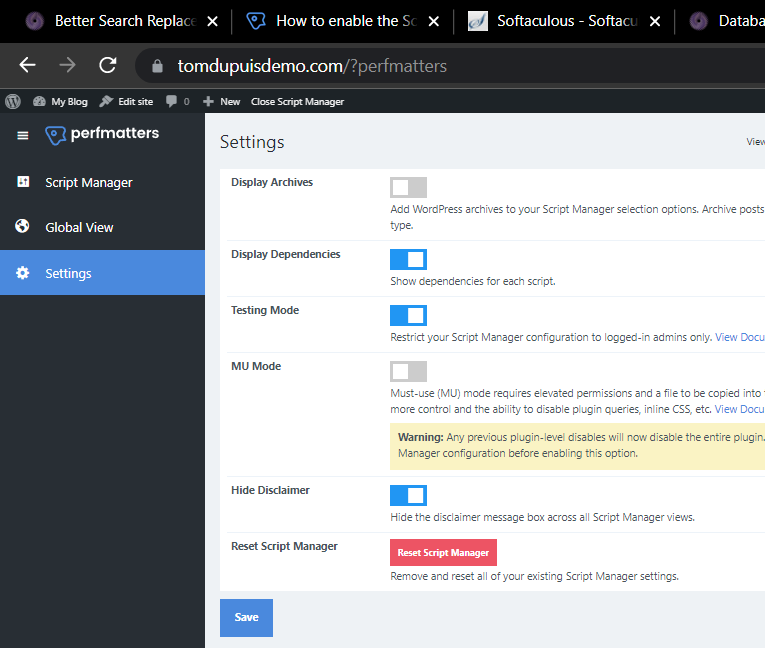
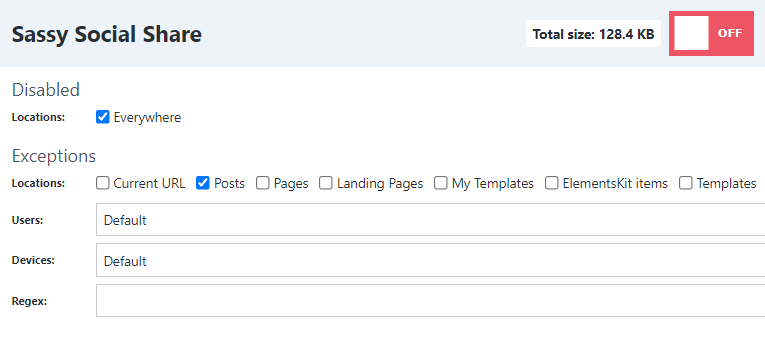
In Asset CleanUp, you can also enable test mode in the settings. Edit any page/post, scroll down, and you’ll see Asset CleanUp’s CSS & Javascript Manager. There are several grouping filters and options for preloading and ignoring dependencies, but you’ll notice how there’s no option to unload everywhere except posts or by device. And you’ll need Asset CleanUp Pro to use regular expressions (RegEx) which also comes with the option to add async/defer attributes.

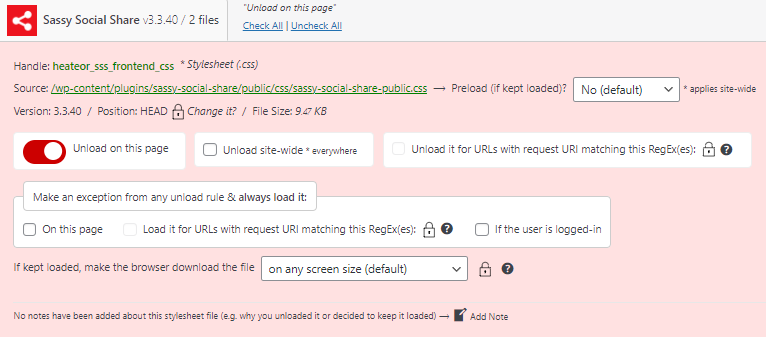
While Perfmatters and Asset CleanUp both unload CSS/JS, Perfmatters has more exception rules, MU mode, RegEx, and device-based unloading. Asset CleanUp Pro includes RegEx and defer/async, but still lacks “except posts” and other exception rules.
2. Remove Unused CSS
Let’s talk about removing unused CSS in Perfmatters which isn’t included in Asset CleanUp.
You have the choice of loading used CSS in a separate file (fastest method) or inline HTML (better for scores but not real world browsing). This is especially helpful if you’re using WP Rocket, SiteGround Optimizer, and other cache plugins that don’t have this feature or use the slower inline method. In which case you should use Perfmatters instead. FlyingPress will also load used CSS in a separate file, so there would be no need to use this feature in Perfmatters. In other words, Perfmatters + FlyingPress are best for removing unused CSS, but only enable one.

3. Delay JavaScript
Perfmatters also lets you delay JavaScript by adding files manually.
This is good if your cache plugin doesn’t do this or if you’re using WP Rocket but want to add more JS files to delay. Check your third-party code report in PageSpeed Insights and the Perfmatters documentation which explains how to delay common third-party code, inline JavaScript, and why you can use both defer/delay. For example, if you use Perfmatters to host Google Analytics locally using analytics.js, you can delay it. This can also be done using Gijo’s Flying Scripts plugin, so I wouldn’t choose Perfmatters over Asset CleanUp just because of this.
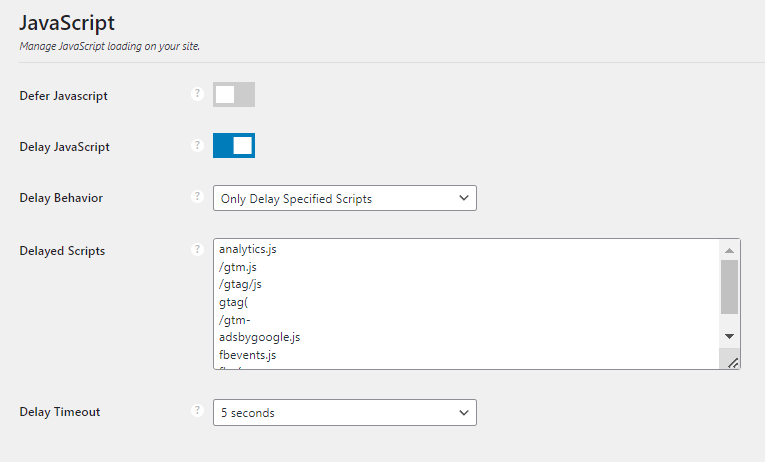
Check the examples from the Perfmatters documentation, but here are the files you would delay for local Perfmatters analytics.js, Google Tag Manager, AdSense, and Facebook Pixel.
analytics.js
/gtm.js
/gtag/js
gtag(
/gtm-
adsbygoogle.js
fbevents.js
fbq(
/busting/facebook-tracking/
4. Image Optimization
Perfmatters has lazy load and image optimization settings while Asset CleanUp doesn’t.
Perfmatters says their JS-based lazy loading is better than native because it lazy loads more resources and because browsers are too eager. Even though it’s JS-based, it only adds a small 2.5KB file to your site. Plus, Perfmatters has settings for iframes, videos, viewport threshold when lazy loading, fade in effect, and other settings sometimes not included with cache plugins.

5. Host Analytics Locally
Perfmatters and Asset CleanUp let you host fonts locally and optimize them, but only Perfmatters lets you host Google Analytics locally.
It also lets you choose from multiple script types (some of which are smaller than others), disable display features, anonymize IP addresses for GDPR compliance, and adjust bounce rate (they recommend 30). With Asset CleanUp, you probably need to use the CAOS Analytics plugin.
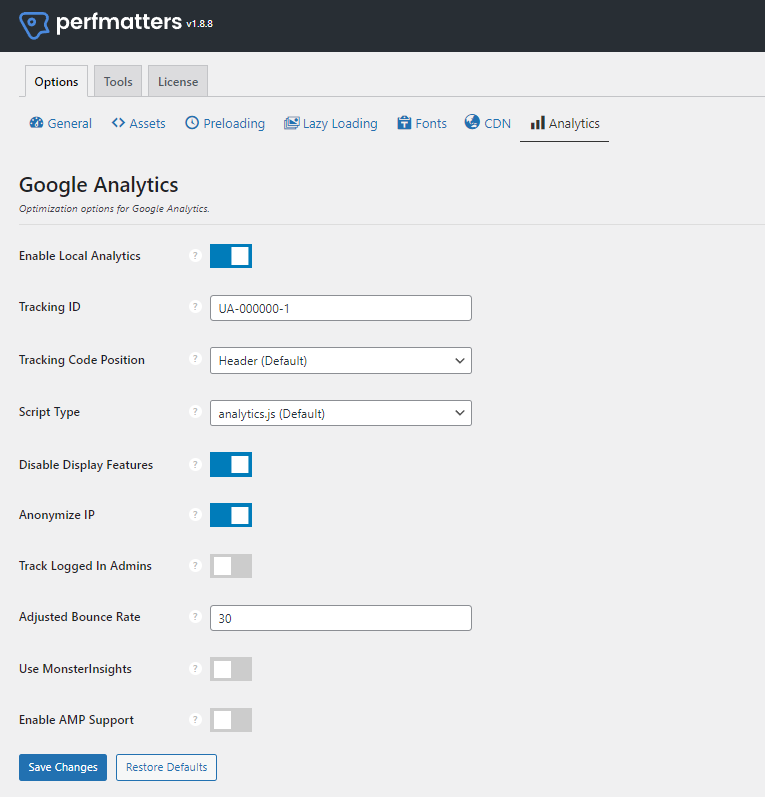
6. Bloat Removal
Both plugins have bloat removal settings.
There are only a couple things Asset CleanUp can do that Perfmatters can’t (disable Gutenberg CSS block library site-wide and remove the post relational links tag). However, Perfmatters has quite a few bloat removal settings not found in Asset CleanUp and therefore, wins this category.
Perfmatters Features Not Found In Asset CleanUp:
- Disable pingbacks
- Disable Google Maps
- Disable password strength meter
- Add blank favicon
- Remove global styles
- Heartbeat, post revisions, autosaves
- Custom login URL
- WooCommerce bloat removal



7. Preload, Prefetch, Preconnect
Asset CleanUp only includes resource hints for fonts (preload local fonts, preconnect fonts.gstatic.com). Whereas Perfmatters lets you preload any file, preconnect/prefetch any domain, preload links (instant page), and preload critical images. More options in Perfmatters.
See the preloading section of my Perfmatters tutorial to learn what to do. Instant page is nice but can also increase CPU usage, preloading should generally be done with only a couple of fonts/images loading above the fold (i.e. background images), preconnect should usually only be done with CDNs + third-party fonts like fonts.gstatic.com (most others should be prefetched), and preload critical images should be set to the typical number of images shown above the fold.

8. CSS/JS Optimization
Let’s talk about something Asset CleanUp is better at: the CSS/JS optimization settings.
It lets you minify, combine, inline, and defer files, cache dynamically loaded files, move jQuery inline code, and move scripts from the header to body. The only problem is most cache plugins already minify, combine, inline, and defer. So unless you need one of the other settings, there really isn’t much need for this to begin with. I will credit Asset CleanUp because it has a lot more configurable CSS/JS settings compared to cache plugins, so that’s a big plus for Asset CleanUp.


9. Pricing + Documentation
Perfmatters is the best bang for your buck IMO.
It has more features than Asset CleanUp and is about 1/2 the cost of Asset CleanUp Pro ($25.95/year vs. $49/year for 1 site). Even then, Asset CleanUp Pro still lacks many features in Perfmatters. I would also argue the Perfmatters documentation is better than Asset CleanUp’s. But hey, it just depends what you need it for. Maybe Asset CleanUp will do just fine on your site.



Perfmatters vs. Asset CleanUp In Facebook Groups
I always like to include some Facebook Group feedback to keep my reviews less biased. Gijo Varghese from WP Speed Matters also prefers Perfmatters mainly because of the better UI/UX.



Cheers,
Tom

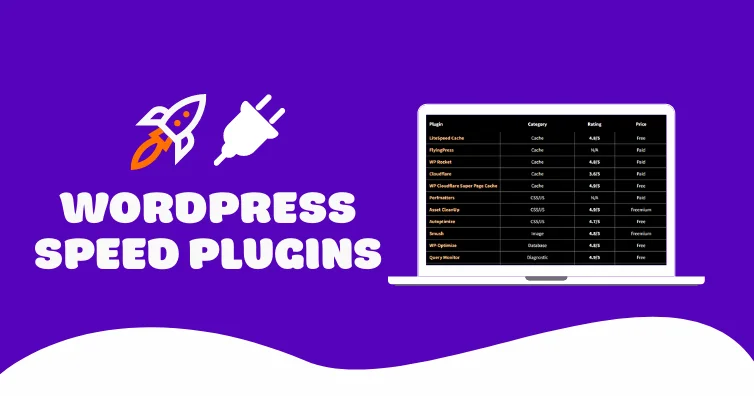
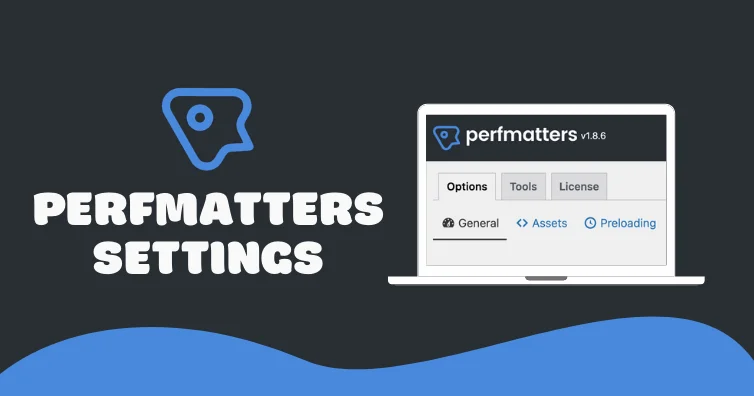
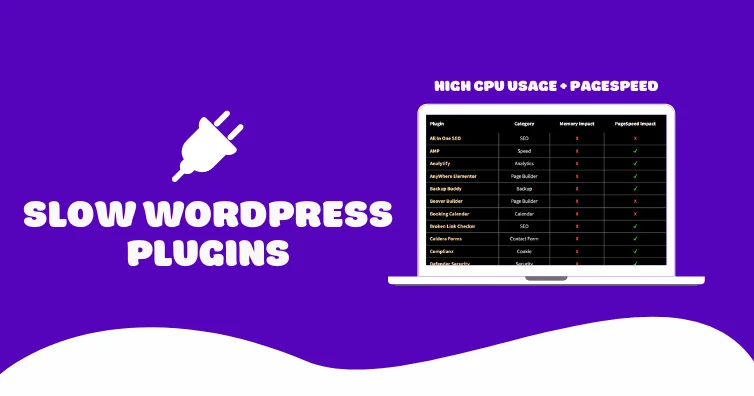

Asset CleanUp has CDN rewrite now
Very informative article, I will probably go with Perfmatters, I thought WP Rocket was all I needed and yet my numbers are still in the red for mobile. Hopefull, this should atleast rasie it to yellow and hopefully green.
A lot of Lighthouse items are related to CSS/JS so it could very well help.
are Perfmatters work with WP Rocket
Yes, I use them both.